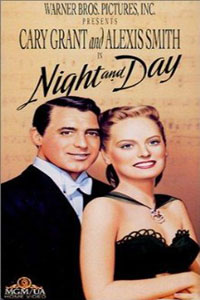
NIGHT AND DAY
US, 1946, 128 minutes, Colour.
Cary Grant, Alexis Smith, Monty Wooley, Ginny Simms, Jane Wyman, Mary Martin, Eve Arden, Dorothy Malone.
Directed by Michael Curtiz.
This film purports to be the biography of Cole Porter and takes its title from one of his most notable songs. Critics agree that it is a largely fictionalised biography. Cary Grant brings his suave style to the role of Porter and is supported by a group of attractive actresses, especially Alexis Smith. Cole Porter's real-life friend, Monty Woolley, appears as himself and is reminiscent of his many comic roles especially The Man Who Came to Dinner. There is some attractive staging of Porter's songs by such singers as Ginny Sims and Jane Wyman as well as by Mary Martin. It is quite enjoyable as popular biographies go with the standard ingredients of family relationships, marriage, success and failure. The film was directed by Michael Curtiz, a veteran of Warner Brothers in the thirties and the maker of a great range of films over a long career. Not as great a film as it might have been.
In Irwin Winkler's Delovely (2004), Kevin Kline and Ashley Judd as Porter and his wife as shown watching this film and being fairly dismissive of it.
1. An enjoyable and entertaining musical, biography? Audience interest in Cole Porter, his life, career, his music and its place in American musical comedy, musical tradition?
2. The quality of the film in the tradition of Warner Bros.' forties biographies? The fact that much of the plot was fictitious? Did this matter? in terms of Porter's life, his music and his career? The irony of the fiction along with the introduction of real characters playing themselves for example Monty Woolly, Mary Martin?
3. The quality of Porter's music, the nature of his lyrics with their froth, satire? How much fooling in the music? The quality of his career, his success as a composer, as a person?
4. It was said that Cary Grant could play Cole Porter jokingly. The Warner Bros contracted Grant. How successful his portrayal of Porter?
5. The quality of the colour, locations, musical style? Popular presentation of a well-known celebrity? The presentation of his music, the songs sung by Mary Martin, Jane Wyman, Ginny Sims and others?
6. How important were the songs for the success of the film: Porter composing them and the scenes of composition (simplified, comical, the difficulties of composition, the staging of the songs, the humour of their presentation, lavish stage productions? An overall good impression of Porter's music? The title song and the more serious songs?
7. How important were the early sequences with the background, the atmosphere of the South, society, America, wealth? Success and careers? Family background?
8. How well did the film portray Porter as a man, the influences on his life, work, the war, Paris, waiting for Linda, the support of Woolley? His marriage, his obsession with work, his overworking and preoccupation with it? Shows, success, critical acclaim, rehearsals? The breakdown of the marriage? How much insight into the character and life of a composer? The point of exploring such a life and career?
9. How conventional the presentation of Linda? as a person, her love for Porter? her waiting for him, her influence on his life and work, the success of their careers, wealth and the breaking of their marriage and her being hurt?
10. Monty Woolley portraying himself? what kind of character did he communicate himself as? As professor, giving up this work, being involved in show business, his friendship and support of Porter?
11. The characters portrayed by Jane Wyman, Mary Martin Ginny Sims etc.? An occasions for women in Porter's life, portraying the songs?
12. The film as a piece of Americana? Its place in the forties and during Porter's lifetime, now?